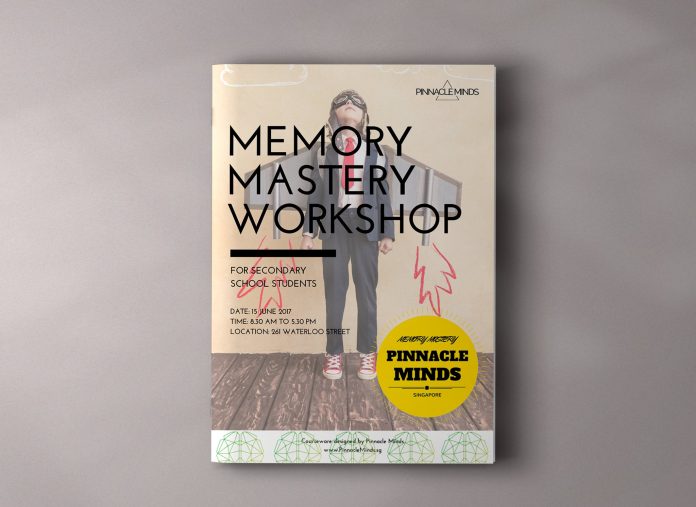Pinnacle Minds is a memory training company in Singapore that has helped individuals and companies improve their memory skills through expert training techniques. In this article titled “The Psychology of Memory Training: Pinnacle Minds’ Expert Insight,” we speak to the founder of the company, Sancy Suraj, to gain insight into the psychology of memory training and how Pinnacle Minds helps its clients overcome challenges in improving their memory. Sancy Suraj provides expert insight into the role of emotions, motivation, mindset, and cognitive and behavioral psychology in memory training, as well as recent advances in our understanding of memory psychology.

Can you explain the psychology behind how memory training works, and why it can be so effective?
Certainly! Memory training is rooted in the science of cognitive psychology, which explores how the brain processes, stores, and retrieves information. The human brain has an incredible capacity to learn and remember vast amounts of information, but sometimes we struggle to retain what we’ve learned. This is where memory training techniques come in. At Pinnacle Minds, we utilize a variety of proven techniques that are designed to enhance memory performance by tapping into the brain’s natural processes.
One of the most important aspects of memory training is the concept of encoding, which refers to the process of transforming information into a format that can be stored in memory. Our brains are constantly bombarded with information, so it’s crucial to use effective encoding strategies that can help us remember important details. Some examples of encoding strategies that we teach include using visual imagery, chunking information into smaller groups, and linking information to pre-existing knowledge.
Another key component of memory training is retrieval practice, which involves actively recalling information in order to strengthen the memory trace. Retrieval practice has been shown to be a highly effective way to improve long-term memory retention, as it helps to consolidate the memory and make it more resistant to forgetting. At Pinnacle Minds, we utilize various retrieval practice techniques such as spaced repetition, which involves reviewing information at increasingly spaced intervals, and self-testing, which involves quizzing oneself on the material.
In addition to these strategies, we also focus on the importance of motivation and mindset in memory training. Students who are motivated to learn and believe that they can improve their memory performance are more likely to engage with the techniques and see results. We also emphasize the importance of creating a positive learning environment that is free from distractions and conducive to effective learning. By incorporating these principles of cognitive psychology into our memory training programs, we have seen remarkable results in helping individuals of all ages improve their memory performance and achieve their academic and professional goals.
What are some of the most common challenges that people face when trying to improve their memory, and how does Pinnacle Minds help them overcome those challenges?
Improving memory can be a challenging task, and individuals may face various obstacles that hinder their progress. At Pinnacle Minds, we have identified some of the most common challenges that people face when trying to improve their memory and have developed strategies to help them overcome those challenges.
One of the biggest challenges is a lack of motivation or confidence. Many people believe that memory is something that cannot be improved or that they are simply not “good” at remembering things. This negative mindset can be a major barrier to progress. At Pinnacle Minds, we help individuals develop a growth mindset by emphasizing the fact that memory is a skill that can be developed and improved with practice. We also use positive reinforcement and encourage individuals to celebrate their progress, no matter how small.
Another common challenge is a lack of focus or attention. Our brains are bombarded with information every day, and it can be difficult to filter out the distractions and focus on the task at hand. At Pinnacle Minds, we teach individuals how to improve their concentration and focus through mindfulness techniques, such as meditation and deep breathing. We also provide strategies for reducing distractions and creating a more conducive learning environment.
A third challenge is simply not knowing which memory techniques to use or how to use them effectively. There are countless memory techniques available, and it can be overwhelming to know where to start. At Pinnacle Minds, we provide individuals with a variety of proven memory techniques and help them identify which ones work best for their learning style. We also provide ongoing support and feedback to ensure that individuals are using the techniques effectively and making progress towards their memory goals.
In summary, improving memory can be a challenging task, but with the right mindset, focus, and memory techniques, individuals can make significant progress. At Pinnacle Minds, we help individuals overcome common challenges by developing a growth mindset, improving concentration and focus, and providing guidance and support for using memory techniques effectively.
Can you discuss some of the research that supports the efficacy of memory training, and how that research has informed Pinnacle Minds’ approach?
Certainly! There is a growing body of research that supports the efficacy of memory training, and this research has informed Pinnacle Minds’ approach to memory training. Here are a few key findings from the research:
• Memory training can improve working memory: Working memory is the ability to temporarily hold and manipulate information in the mind. Research has shown that memory training can improve working memory, and that these improvements can transfer to other cognitive tasks. For example, a study published in the Journal of Experimental Psychology found that memory training led to improvements in working memory capacity, and that these improvements were associated with improved performance on other cognitive tasks, such as problem-solving and decision-making.
• Memory training can improve academic performance: Memory training has been shown to improve academic performance in a variety of contexts. For example, a study published in the Journal of Educational Psychology found that memory training improved performance on a standardized math test among middle school students. Another study published in the journal Frontiers in Psychology found that memory training improved reading comprehension and vocabulary among college students.
• Memory training can improve quality of life: Memory training can also improve quality of life for individuals with cognitive impairments or age-related memory decline. For example, a study published in the journal Neuropsychological Rehabilitation found that memory training led to improvements in everyday memory functioning and quality of life among individuals with traumatic brain injury. Another study published in the journal Aging, Neuropsychology, and Cognition found that memory training improved memory performance and mood among older adults with mild cognitive impairment.
At Pinnacle Minds, we incorporate these research findings into our approach to memory training by utilizing evidence-based techniques that are designed to improve working memory, academic performance, and quality of life. We also incorporate ongoing assessment and feedback to ensure that individuals are making progress towards their memory goals. By staying up-to-date with the latest research on memory training, we are able to provide our clients with the most effective and evidence-based memory training techniques.
“Memory training has been shown to improve working memory, academic performance, and quality of life, according to research findings. At Pinnacle Minds, we utilize evidence-based techniques to help our clients achieve their memory goals and stay up-to-date with the latest research to provide the most effective memory training.”
How does Pinnacle Minds work with clients to identify the underlying psychological factors that may be impacting their memory, and develop strategies to address those factors?
At Pinnacle Minds, we recognize that memory is not just a cognitive ability, but also influenced by psychological factors such as stress, anxiety, and attention. That’s why we work closely with our clients to identify the underlying psychological factors that may be impacting their memory, and develop strategies to address those factors.
Our process typically begins with a comprehensive assessment of our client’s memory abilities and psychological profile. This assessment may include standardized memory tests, self-report measures of psychological factors, and interviews with the client and their family members. Based on the results of the assessment, we work with the client to develop a personalized memory training plan that addresses both their cognitive and psychological needs.
For example, if we identify that a client is experiencing high levels of stress or anxiety, we may incorporate relaxation techniques such as mindfulness meditation or deep breathing exercises into their memory training plan. If we identify that a client is struggling with attention or focus, we may incorporate strategies such as chunking or visualization to help them better organize and remember information.
Throughout the memory training process, we also provide ongoing support and feedback to help clients overcome any psychological barriers that may be impacting their memory. We encourage our clients to be proactive in their memory training and to communicate openly with us about any challenges they may be facing.
Ultimately, our goal at Pinnacle Minds is not just to improve our clients’ memory abilities, but also to help them lead happier, healthier, and more fulfilling lives. By addressing the underlying psychological factors that may be impacting their memory, we are able to provide our clients with a more holistic approach to memory training that addresses both their cognitive and psychological needs.
What role do emotions and stress play in memory, and how does Pinnacle Minds help clients manage those factors in their memory training?
Emotions and stress can have a significant impact on memory. Stress, in particular, can interfere with the encoding, consolidation, and retrieval of information, making it more difficult to remember things accurately. At Pinnacle Minds, we recognize the role that emotions and stress play in memory, and we work closely with our clients to help them manage those factors in their memory training.
One of the ways we help our clients manage emotions and stress in their memory training is by incorporating relaxation techniques such as deep breathing exercises, progressive muscle relaxation, and mindfulness meditation. These techniques can help our clients reduce stress and anxiety, and improve their ability to focus and concentrate on the information they are trying to remember.
Another way we help our clients manage emotions and stress in their memory training is by teaching them cognitive-behavioral strategies such as reframing negative thoughts and beliefs. For example, if a client is feeling stressed about an upcoming exam, we may work with them to identify any negative thoughts or beliefs they have about their ability to perform well. We then help them reframe those thoughts and beliefs in a more positive and realistic way, which can help reduce stress and improve their confidence and motivation.
At Pinnacle Minds, we also recognize that emotions and stress can sometimes be related to underlying psychological issues such as depression or anxiety. In those cases, we may work with the client to refer them to a mental health professional who can provide additional support and treatment.
Overall, our goal at Pinnacle Minds is not just to improve our clients’ memory abilities, but also to help them manage the emotions and stress that can interfere with memory. By teaching relaxation techniques, cognitive-behavioral strategies, and other coping skills, we are able to provide our clients with a more holistic approach to memory training that addresses both their cognitive and psychological needs.
“Managing emotions and stress is essential for optimal memory performance. At Pinnacle Minds, we provide our clients with the tools and techniques to reduce stress and anxiety, improve focus and concentration, and reframe negative thoughts and beliefs. By addressing the psychological and cognitive aspects of memory, we provide a holistic approach to memory training that empowers our clients to achieve their memory goals and improve their overall well-being.”
When asked about the psychology behind memory training, Sancy Suraj explains how our brains are wired to remember information that is important to us and that memory training involves learning techniques to improve our ability to store, retain and retrieve information. He further explains that Pinnacle Minds works with clients to identify the underlying psychological factors that may be impacting their memory, and develop strategies to address those factors. Additionally, he discusses the role of emotions and stress in memory and how Pinnacle Minds helps clients manage those factors in their memory training.
Sancy Suraj also speaks to the importance of motivation and mindset in memory training, and how Pinnacle Minds helps clients cultivate a positive and growth-oriented mindset. He discusses the principles of cognitive and behavioral psychology that are incorporated into their memory training programs and how recent advances in memory psychology are shaping their approach.
In terms of applying memory training principles in daily life, Sancy Suraj explains how Pinnacle Minds works with clients to ensure that those principles become habitual and automatic. He offers practical tips for anyone looking to improve their memory, such as engaging in regular mental exercises, practicing active recall, and breaking information down into smaller, more manageable pieces.

Can you talk about the role of motivation and mindset in memory training, and how Pinnacle Minds helps clients cultivate a positive and growth-oriented mindset?
Motivation and mindset are crucial factors in memory training. Without a positive and growth-oriented mindset, it can be difficult for clients to stay motivated and committed to the memory training process. At Pinnacle Minds, we recognize the importance of motivation and mindset in memory training, and we work closely with our clients to help them cultivate a positive and growth-oriented mindset.
One way we help our clients cultivate a positive mindset is by focusing on their strengths and building on them. We help our clients identify their natural learning style and memory strengths and then tailor our training approach to leverage those strengths. This helps clients feel more confident and capable of learning and retaining information, which can be a powerful motivator.
We also encourage clients to adopt a growth mindset, which is the belief that abilities and intelligence can be developed through hard work and dedication. We help our clients understand that memory is a skill that can be improved through practice and training, and we work with them to set achievable goals and celebrate their progress along the way. This approach helps clients develop a more positive and growth-oriented mindset, which can increase their motivation and commitment to the memory training process.
Another way we help clients cultivate a positive mindset is by providing a supportive and encouraging learning environment. Our trainers are skilled at creating a positive and collaborative learning atmosphere, where clients feel comfortable asking questions and taking risks. We also use positive reinforcement and feedback to help clients build confidence and maintain motivation.
Overall, our approach at Pinnacle Minds is focused on helping clients cultivate a positive and growth-oriented mindset that supports their memory training goals. By leveraging clients’ strengths, adopting a growth mindset, and providing a supportive learning environment, we help clients develop the confidence, motivation, and commitment needed to succeed in memory training and beyond.
How does Pinnacle Minds incorporate the principles of cognitive and behavioral psychology into its memory training programs?
At Pinnacle Minds, we incorporate principles of cognitive and behavioral psychology into our memory training programs. These principles help us better understand how people learn, retain, and retrieve information, and they inform our training methods and techniques. Here are some ways we incorporate these principles into our programs:
Firstly, we use cognitive psychology principles to help clients understand how their memory works. We teach clients about the different types of memory, how information is encoded and stored, and the factors that influence memory performance. By understanding these cognitive processes, clients can develop strategies to improve their memory and apply these strategies in their daily lives.
Secondly, we use behavioral psychology principles to help clients develop positive habits and behaviors that support memory performance. We work with clients to identify habits and behaviors that may be hindering their memory performance and help them replace those habits with more effective ones. For example, we may teach clients to use mnemonic devices or to practice spaced repetition, which are evidence-based techniques that have been shown to improve memory performance.
Thirdly, we incorporate principles of cognitive and behavioral psychology into our training methods and techniques. For example, we use active learning techniques to engage clients in the learning process and help them retain information more effectively. We also use positive reinforcement and feedback to help clients build confidence and maintain motivation.
Overall, by incorporating principles of cognitive and behavioral psychology into our memory training programs, we can provide clients with a more effective and evidence-based approach to memory training. By understanding how memory works, developing positive habits and behaviors, and applying evidence-based techniques, clients can improve their memory performance and achieve their memory training goals.
Can you discuss any recent advances in our understanding of the psychology of memory, and how those advances are shaping Pinnacle Minds’ approach?
There have been many recent advances in our understanding of the psychology of memory that are shaping Pinnacle Minds’ approach to memory training. Here are a few of the most significant developments:
• Neuroplasticity: Recent research has shown that the brain is capable of changing and adapting in response to experience, a phenomenon known as neuroplasticity. This means that with the right training and practice, individuals can improve their memory performance by strengthening the neural pathways associated with memory. At Pinnacle Minds, we incorporate neuroplasticity principles into our memory training programs by providing clients with targeted and challenging memory exercises designed to strengthen their neural pathways.
• Multisensory Memory: Another recent advance in our understanding of memory is the idea of multisensory memory. This refers to the fact that memory is not just a visual or auditory process, but instead involves multiple senses. By engaging multiple senses during the encoding and retrieval of information, individuals can improve their memory performance. At Pinnacle Minds, we incorporate multisensory memory techniques into our training programs by using visual, auditory, and kinesthetic exercises to help clients encode and retrieve information.
• Memory and Emotion: Recent research has also highlighted the important role that emotion plays in memory. Emotionally charged events are often more memorable than neutral events, and individuals can use this to their advantage by attaching emotional significance to important information they want to remember. At Pinnacle Minds, we incorporate emotion-based memory techniques into our training programs by teaching clients how to use emotion to enhance their memory performance.
Overall, by staying up to date with the latest research in the psychology of memory, Pinnacle Minds can continue to provide our clients with the most effective and evidence-based memory training programs. By incorporating advances in neuroplasticity, multisensory memory, and the role of emotion in memory, we can help clients improve their memory performance and achieve their memory training goals.
How does Pinnacle Minds work with clients to apply the principles of memory training in their daily lives, and ensure that those principles become habitual and automatic?
At Pinnacle Minds, we understand that the ultimate goal of memory training is not just to improve performance during memory exercises, but to apply those skills in real-world situations. To help our clients achieve this goal, we use a variety of techniques to ensure that the principles of memory training become habitual and automatic.
One key approach we use is spaced repetition. This involves revisiting information at increasing intervals over time to strengthen memory retention. By incorporating spaced repetition into our training programs, we help clients develop the habit of regularly reviewing and consolidating important information.
Another technique we use is transfer-appropriate processing. This refers to the idea that memory is most effective when the way information is processed during learning matches the way it will be processed during retrieval. At Pinnacle Minds, we work with clients to identify the types of information they need to remember in their daily lives and then tailor our memory exercises to match those situations. This helps clients develop the habit of applying memory strategies in contextually appropriate ways.
We also place a strong emphasis on self-monitoring and self-regulation. By helping clients develop awareness of their own memory strengths and weaknesses, we empower them to take ownership of their memory training and develop effective strategies for maintaining and improving their memory performance over time. Through regular feedback and coaching, we help clients cultivate the habit of reflecting on their own memory performance and adjusting their strategies as needed.
Overall, by using spaced repetition, transfer-appropriate processing, and self-monitoring and self-regulation techniques, we help clients apply the principles of memory training in their daily lives and ensure that those principles become habitual and automatic. By building these habits, our clients are able to achieve long-term improvements in their memory performance and enjoy the benefits of a stronger and more reliable memory in all areas of their lives.
Finally, what advice would you give to someone who is interested in improving their memory but doesn’t know where to start?
If you’re interested in improving your memory but don’t know where to start, there are several key strategies that you can use to get started. First and foremost, it’s important to understand that memory is not something you’re born with – it’s a skill that can be developed and improved with practice.
One effective strategy for improving your memory is to practice active recall. This involves actively trying to retrieve information from memory, rather than simply reading or reviewing it passively. For example, you might try to recall the details of a conversation you had earlier in the day, or try to remember a list of items you need to pick up from the grocery store. By practicing active recall regularly, you can strengthen your ability to remember information over time.
Another key strategy for improving memory is to engage in regular physical exercise. Research has shown that regular exercise can help improve cognitive function, including memory. This may be because exercise helps increase blood flow and oxygen to the brain, which in turn helps support the growth and development of new brain cells.
Finally, it’s important to get enough sleep and manage stress effectively. Both sleep deprivation and chronic stress can have a negative impact on memory and cognitive function. By making sure you’re getting enough restful sleep and finding effective ways to manage stress, you can help support the health and function of your brain and improve your memory over time.
Overall, improving your memory is a skill that takes time and practice. By incorporating strategies like active recall, regular exercise, and effective stress management into your daily routine, you can start to see improvements in your memory performance over time. Remember, everyone’s memory abilities are different, so be patient and focus on progress, not perfection.
“Memory is not something you’re born with – it’s a skill that can be developed and improved with practice. By incorporating strategies like active recall, regular exercise, and effective stress management into your daily routine, you can start to see improvements in your memory performance over time.”
In conclusion, Pinnacle Minds’ expert training techniques have helped numerous individuals and companies improve their memory skills. Through the insights provided by Sancy Suraj, we gain a better understanding of the psychology behind memory training and the various factors that impact our memory. With the practical advice offered by Pinnacle Minds, anyone can take steps towards improving their memory and achieving success in their personal and professional lives.
















